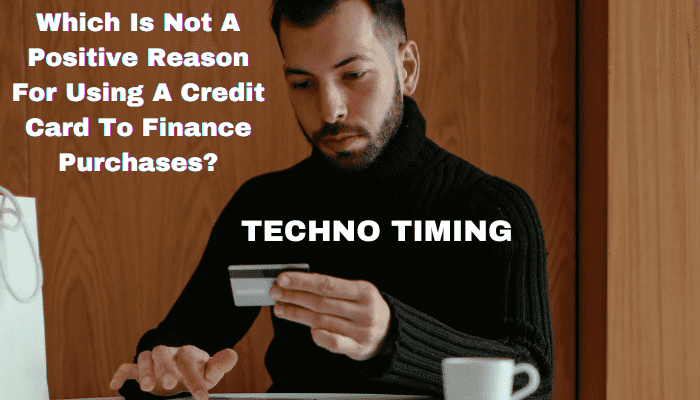The Risks of Using Credit Cards to Finance Purchases: A Comprehensive Analysis | TECHNO TIMING
The question: which is not a positive reason for using a credit card to finance purchases? Credit cards are convenient to use, earn rewards and build credit. But they also come with big risks if not managed properly. This post will go through the reasons why you should not use credit card to finance purchases.
Introduction
Credit cards are a blessing and a curse. While they give you easy access to funds and rewards, they also pose big risks that can lead to debt and financial instability. This post will go through the reasons why you should not use credit card to finance purchases.
Reasons Why You Should Not Use Credit Card to Finance Purchases
1. Overspending
1.1. Temptation to Spend More
- Having a high credit limit can give you a false sense of financial security and make you spend beyond your means. This can lead to a debt cycle that’s hard to get out of.
- Debt Trap: Overspending can quickly get you into a debt trap where you can only make minimum payments and interest will keep on accumulating and debt will grow exponentially.
2. Fraud
Credit cards are prone to fraud especially in online transactions. Fraud can result to big financial losses and time consuming to settle.
- Online Fraud: With the rise of online shopping, credit card information can be easily hacked. This can lead to unauthorized transactions and potential financial loss.
- Identity Theft: Credit card fraud can also lead to identity theft where the fraudster uses the stolen information to open new accounts or make big purchases, affecting the victim’s credit score and financial stability.
3. High Interest Charges
If you don’t pay your credit card bill in full by the due date, the remaining balance will incur interest. Credit cards have high interest rates so it’s expensive to carry a balance.
- Compound Interest: Interest on credit card balances compounds, meaning you’ll pay interest on interest, which can quickly add up and make it hard to pay off the debt.
- Minimum Payments: Making only the minimum payment will extend the debt repayment period and increase the total interest paid, and you’ll be stuck in a debt cycle forever.
4. Fees
Credit cards have fees and they add up fast and make credit card debt expensive.
- Annual Fees: Many credit cards have an annual fee for using the card. Some cards offer rewards that can offset this but it’s an extra cost.
- Late Fees: Miss a payment and you’ll get hit with late fees which can be big and add to your debt.
- Foreign Transaction Fees: Using your credit card abroad or for international purchases will incur foreign transaction fees and add to the cost of your purchase.
5. Debt Risk
High credit limits can tempt you to overspend and get into financial trouble and debt.
- Financial Trouble: Debt can strain your finances and make it hard to pay for essentials and save for the future.
- Credit Score Impact: High debt can hurt your credit score and make it harder to get good loan terms or new credit in the future.
Using Credit Cards Responsibly
Credit cards have risks but can be managed with responsible use. Here are some tips to avoid the debt traps of credit card financing:
- Budget: Create a monthly budget and stick to it. Only charge what you can pay off in full each month.
- Pay in Full: Always pay your credit card balance in full by the due date to avoid interest.
- Monitor: Review your credit card statements regularly to keep track of your spending and catch any unauthorized transactions.
- Limit Applications: Don’t apply for multiple credit cards at once, it can hurt your credit score.
- Use Rewards: If your credit card has rewards, use them wisely to get the most benefits without overspending.
Summary
Credit cards can be a great tool when used responsibly. But the risks of overspending, fraud, high interest, fees and debt are real and shouldn’t be ignored. By knowing these risks and using your credit cards wisely you can avoid the financial traps and have a healthy financial future.
Knowing the downsides of using credit cards for purchases is key. By being informed and using your credit cards responsibly you can get the most out of your credit card and minimize the risks.
FAQs
What’s not a good reason to use a credit card to buy something?
The answer is “You’ll be charged high interest.” High interest isn’t a good reason to use a credit card to buy something.
What’s a good reason to use a credit card to buy something?
Credit cards are safer to carry than cash and have stronger fraud protection than debit. You can earn rewards without changing your spending habits. Easier to track your spending. Using credit responsibly is one of the fastest ways to build credit.
What are bad reasons to use your credit card to buy something?
Credit cards make it too easy to overspend. Buying on credit can also make your purchases more expensive, considering the interest you’ll pay on them. Getting into too much debt can hurt your credit score and strain relationships with family and friends.
What’s not an advantage of a credit card?
High credit card interest rates — and how fast they can add up to debt — is a downside of credit cards. But if you pay your balance in full and on time you can earn rewards and a good credit score.
How do I avoid overspending on my credit card?
5 ways to not overspend on your credit card:
- Only spend what you can pay off right now.
- Don’t make impulse purchases.
- Start tracking your spending.
- Don’t let rewards tempt you.
- Avoid store credit cards.
How do high interest charges affect credit card debt?
First, high interest rates usually add to the cost of borrowing on your credit accounts. The higher the interest rate, the more expensive your debt will be over time and the longer it will take to pay off what you owe. This is especially true when interest is compounded.
What are credit card surcharges?
What is a credit card surcharge? A surcharge is a fee a business or merchant adds to the price of a purchase when you pay with a credit card instead of cash. The surcharge is usually a percentage of the total purchase and can be 1% to 4%.
Also Read: Which Shows the Pre-Image of Triangle X’Y’Z’ Before a 90° Rotation


